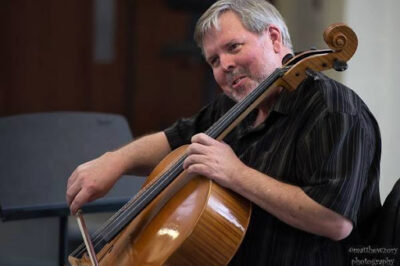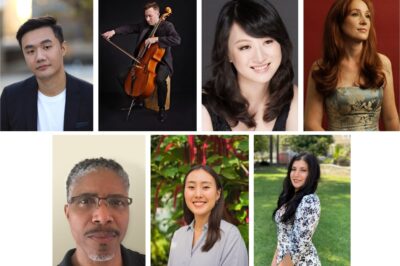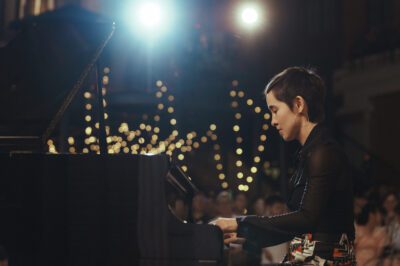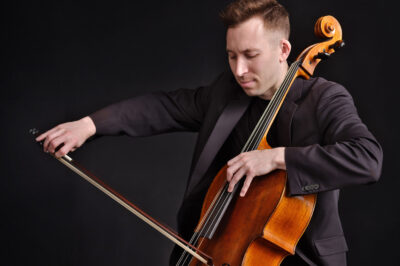Brandon Encinas
Brandon Encinas, PCM’s Suzuki Violin & Viola Program Coordinator, has been working at the Conservatory since 2018. Outside of PCM, he’s performed on The Voice, played with artists like Billie Eilish, and toured worldwide. Read below for more details about how these experiences have taught him the power of connection through music and how through the Suzuki approach and PCM’s emphasis on community, he’s able to share this message with his students.
This interview was conducted on 6/25/24 and has been edited for length and clarity.
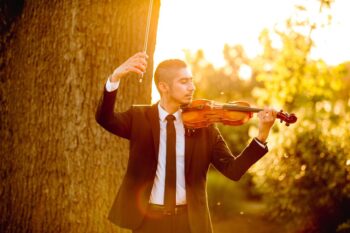
Do you have a favorite musical experience or highlight from your career that you’d like to share?
My favorite experiences have been touring. One was when we went to Haiti, right after the first earthquake in 2010. It was a super powerful experience where music went beyond language. None of us spoke the native languages there but the communities welcomed us with hospitality and respect because we brought something that we could all share. Everything else was stripped away, and it was brought down to a common experience.
I’ve also done some exciting things in LA in the recording industry. I recorded and performed live on stage with Billie Eilish for her 2022 Oscar Award-winning performance of, “No Time to Die.” I’ve also performed with Jennifer Lopez and Lady Gaga. Everyone thinks that when you perform with stars, you get to meet them but this is not always the case. They might be amongst you or not but we all have this level of ability to put our art together. And that’s always a miracle to me, how you might walk into a room full of people you’ve never met before and you have this common experience that becomes something beautiful.
You’ve also played on The Voice a couple of times, what were those experiences like?
Every time I go on The Voice, it’s an amazing experience because I am so impressed by the level of production. We’re usually given a handful of songs to memorize and rehearse then perform for the camera. And it’s so exciting to see how it all comes together. We’ll have three-minute breaks and during that time they’ve somehow torn apart the entire stage, built a completely different stage with lights, things are coming from different angles, and everyone’s moving things into place. Then you hear four clicks in your ear and you just go. It’s so exciting and a huge rush being onstage and a part of this well-oiled machine.
So how have those experiences influenced your teaching style and vice versa? How has your teaching experience influenced your performance style?
They definitely both benefit each other. I have become a far more skilled instrumentalist over the years of teaching because it requires me to break down the technical elements of the violin and helps me discover what inspires me about it. Having to voice that to students of a young age in a way that they can understand is so magical. When I was younger, learning to read sheet music was so boring but it’s now one of my favorite lessons. I start by asking them where the music comes from and most kids automatically point to the sheet music. I respond by putting my ear up to the paper and saying “I don’t hear anything”. The cycle repeats when I ask again and they point to the violin. Finally, I lead the students to understand that the music comes from them. The sheet music is just there as an instruction manual but it has to be in their heart and mind so they can hear it, visualize it, and feel it in their body to produce something bigger. But the reason we need to learn to read music is so we can walk into a room of musicians or perform for The Voice and all play music we’ve never seen before.
Your teaching philosophy centers around growth and you embody this by working with your students to develop concrete goals and a plan for achieving them. What were some of your goals when you first started as a musician? What are some of your current goals?
I’ve wanted to play the violin since I was five years old and I saw someone playing it and my little five-year-old brain thought: “Wow. This person has a tree in their hand that they’re massaging and the tree is singing because it likes it!” I knew from that moment that music was a magical thing. Then I knew from the first day of having a violin lesson that I wanted to be a teacher because of how my teachers changed my life. I thought, “I’m going to be the one to change the next person’s life.” And that’s what happened. One of my earlier students went on to study at the Colburn School of Music and then went straight from Colburn to Oberlin College and now he’s graduated and has played with Cyndi Lauper and Josh Groban. And it makes me so proud because it’s my goal to make my students better than me and surpass what I did with my life through music.
Is there anything else you’d like to add?
I would like to highlight the Suzuki approach and how it changed my whole perspective on teaching. Especially teaching younger kids. A lot of teachers find it daunting to teach students from a young age, and I did as well until I fully understood the child development process and learned how to communicate very complex concepts such as the voice of music coming from the person, not the paper.
PCM has provided me with a platform to create that space. We have a community of music that goes beyond the private lesson, it’s not about playing for the four walls of the practice room. Students make friends and share music with their community in group classes, concerts, and jam sessions. That mentality of bringing music to life is so potent here at PCM and creates this amazing environment where students fully understand and grasp what music really is.
